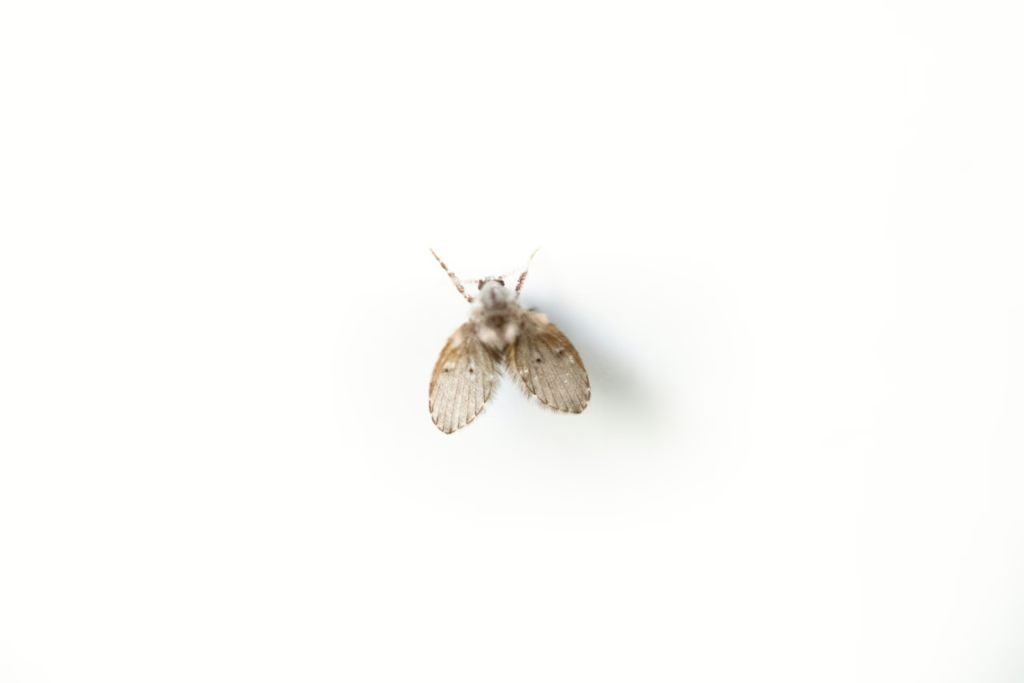We get a ton of questions from our clients regarding fruit flies and how to finally get rid of them for good. Let’s be real, these tiny insects are incredibly annoying! They hover in the air, buzz around our faces, and seem to instantly appear on that fresh apple you just set on the counter. But where do these persistent little pests even come from, and more importantly, what really works to get rid of them?
You’re in luck! We’ve put together the most effective tips and tricks that have worked for countless clients over the years to help you learn how to kill fruit flies in drains and banish them from your home for good.
The Origin Story: Where Do Fruit and Drain Flies Come From?
These unwelcome guests have several sneaky ways of entering your home:
- Hitching a Ride: Often, fruit flies arrive on fresh produce from the grocery store or a local farmer’s market. They can also breed in plants or flowers you bring indoors.
- Open Invitations: They can easily fly in through open windows or even slip through screens on windows and doors if there are tiny gaps.
- The Sewer Connection: In some cases, they find their way in through damaged sewer drains. Once inside, they’ll breed on any organic material clinging to the drain pipe.
Why Your Drains Are Ground Zero for Fruit Fly Infestations
If you keep seeing these flies emerging from your sink, you’re not imagining it. Drains are a prime breeding ground. Fruit and drain flies need a dark, damp place to breed, and your drain offers the perfect, undisturbed environment. In fact, a single female fruit fly can lay up to 500 eggs in your drain alone! Yes, you read that correctly – 500 eggs! This explains why you’ll often find them congregating in your kitchen, bathroom, or around other water sources. For fruit flies, your drain is the most suitable home to hide, lay eggs, and multiply.
This is why it’s extremely important to not only keep your drains clean but also to understand what kills fruit flies in drains at their source. Conventional cleaners like bleach or vinegar aren’t very effective because they don’t break down the organic material (biofilm) in your pipes where the flies are breeding. Instead, specialized products like drain degreasers or microbial cleaners are far more effective at dealing with the problem where it starts.
Your Action Plan: How to Kill Fruit Flies in Drain & Beyond
It might seem difficult to get rid of fruit and drain flies permanently, but with diligence and consistency, you absolutely can prevent them from coming back. Here are our most successful homemade tricks and crucial prevention steps.
Important Note: When using traps, make sure to keep them clean and in place for a couple of weeks to catch any newly hatched flies. The key to success is immediate action when you spot flies, before they have a chance to multiply further.
Homemade Traps to Get Rid of Fruit Flies Quickly
If you’re wondering how to get fruit flies out of drain areas using common kitchen items, these traps are incredibly effective:
- Apple Cider Vinegar Fruit Fly Trap: A shallow bowl filled with about an inch of apple cider vinegar is a powerful attractant. Cover the bowl with plastic wrap, poking a few small holes in it with a toothpick. The strong scent draws the flies in, but they can’t find their way back out. For best results, change the vinegar daily.
- Red Wine Fruit Fly Trap: Similar to apple cider vinegar, a bottle with an inch or two of old red wine or beer is practically a magnet for fruit flies. Create a simple paper funnel (you can roll a piece of paper or use a kitchen funnel) and insert the narrow end into the bottle. Tape it in place if needed. The flies will go in but struggle to escape. Remember to change the wine daily for optimal effectiveness.
What Kills Drain Flies in Drains: A Powerful Solution
For tackling drain flies directly in their breeding ground, this concoction is highly effective:
- Combine ½ cup of salt with ½ cup of baking soda and 1 cup of white vinegar.
- Carefully pour this mixture down the problematic drain.
- Leave it overnight to work its magic on the organic material.
- The next morning, boil a medium-large pot of water and pour it down the drain to flush everything away.
- Repeat this process twice a week until you no longer see any flies. This is a crucial step in understanding what kills fruit flies in drains effectively.
Easy and Practical Steps for Preventing Fruit and Drain Flies
Once you’ve done the work to eliminate the existing fruit or drain flies, keeping them from coming back is all about prevention. We always tell our clients to integrate these simple steps into their daily household routines for the best results:
- Clean Drains Regularly: Keep your sink drains clean and free of old food and debris. Consider using a drain brush to regularly scrub the inside of your pipes.
- Sanitize Surfaces: Routinely sanitize all countertops, sinks, and open surfaces where food might be present.
- Store Produce Properly: Do not leave ripe fruit or vegetables sitting out on counters. Store produce in the refrigerator or in sealed containers.
- Wash Produce Immediately: As soon as you bring produce home, wash it thoroughly to remove any potential fruit fly eggs or larvae that might be present.
- Frequent Garbage Disposal: Take out the garbage frequently, especially if it contains food scraps.
- Clean Pest Hotspots: Regularly clean other areas that can attract flies, such as garbage cans, pet bedding, litter boxes, and toilets.
We hope you found this post helpful! If you have any questions about our services or are dealing with a persistent infestation, please feel free to call us at (226) 641-0003 or visit our website to learn more at www.thespiderguys.com.

